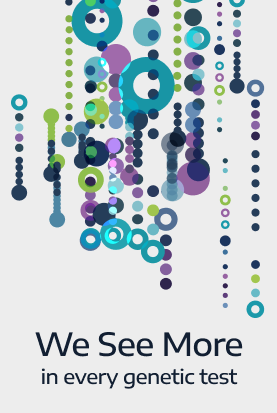MISSED BY OTHERS, DETECTED BY US
IriSight® Case Study
Clinical presentation
A multigravida underwent an anatomy scan at 21 weeks gestation. In addition to IUGR and hydrops fetalis, the following fetal findings were noted:
- Abnormal heart morphology
- Hepatomegaly
- Small stomach
- Echogenic bowel
- Arthrogryposis, joint contracture
- Rocker bottom foot
- Hand clenching
Previous genetic testing
Testing was performed with negative results including:
- Chromosomal microarray
IriSight® Testing
was ordered because of its ability to identify all major variant types in a single test.
Results and interpretation
Variantyx IriSight® testing identified a paternally inherited, likely pathogenic 10.87 kb deletion encompassing DOK7 exons 3-4. Along with a second, maternally inherited, pathogenic c.1263dup DOK7 variant.
Diagnosis: DOK7-related disorders

Uniform data from WGS clearly shows the partial DOK7 deletion (top) and the small sequence change (bottom).
The Variantyx Difference
Why were these variants detected by IriSight® testing, and not detected by chromosomal microarray?
-
The size of the 10.87 kb deletion falls below the cut-off value for CMA (~25 kb).
-
CMA is unable to detect small sequence changes.
Variantyx genome analysis has a detection range from 1 bp to whole chromosomal events, easily detecting the copy number variant as well as the small sequence change.
Want similar results for your patients?
Connect with a Clinical Specialist to find out how easy it is to bring the power of whole genome sequencing into your practice.
